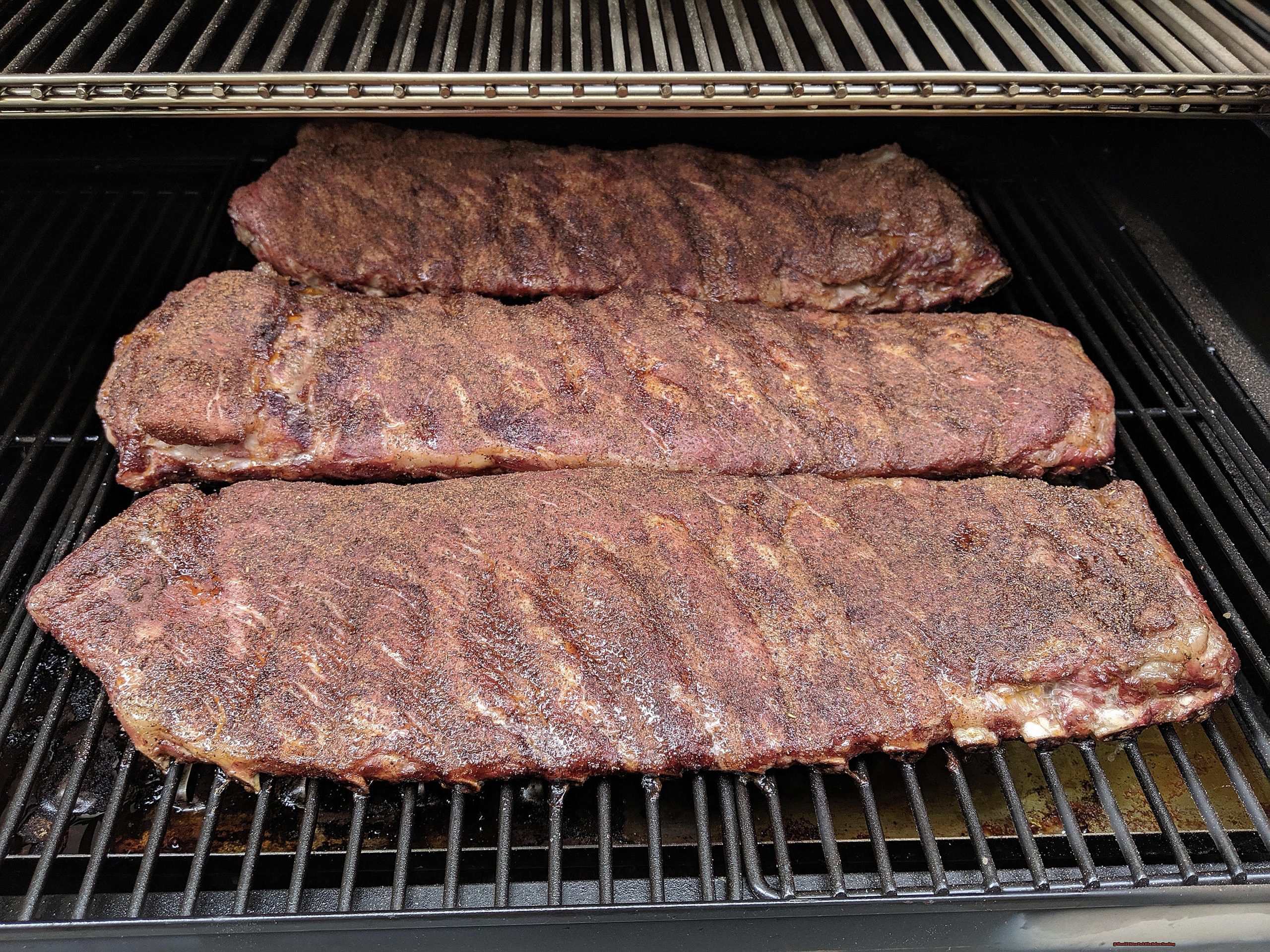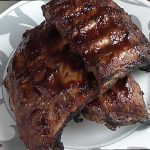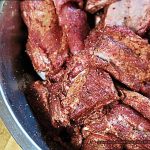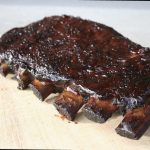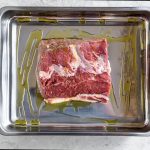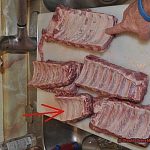Ready to elevate your BBQ game? Today, we’re diving into the age-old debate of whether or not to brine pork ribs before smoking. Some say it’s the secret to juicy and flavorful ribs, while others argue it’s an unnecessary step that can ruin the texture. So who’s right? Let’s dig in and find out.
First things first, what exactly is brining? It’s a process of soaking meat in a saltwater solution, which helps tenderize tough cuts and infuse them with flavor. However, when it comes to pork ribs, they are already naturally tender and packed with flavor from the marbling and fat content.
But don’t write off brining just yet. When done correctly, it can still enhance the taste and texture of your ribs. The key is finding the right balance of salt in the brine. Too little and you won’t see much difference, too much and you’ll end up with overly salty ribs.
On the flip side, some chefs swear by brining for perfectly juicy and flavorful ribs every time. They argue that the salt in the brine helps break down proteins in the meat, resulting in more moisture retention during cooking.
Ultimately, whether or not to brine your pork ribs before smoking comes down to personal preference and experimentation. As a pitmaster or BBQ enthusiast, it’s important to try different techniques and find what works best for you.
So let’s fire up that grill and get smokin’. In this post, we’ll cover everything you need to know about brining pork ribs before smoking – from how long to soak them for optimal results to unique flavor combinations for your brine. Get ready for some mouth-watering BBQ goodness.
Contents
Ingredients Needed for a Basic Pork Rib Brine
Creating a basic pork rib brine requires a few simple ingredients: water, salt, brown sugar, ice cubes, and optional additions like garlic powder, onion powder, pork seasoning, and curing salt. These components work in harmony to elevate the taste, texture, and juiciness of the pork ribs during cooking.
Let’s delve into each ingredient’s purpose in the brine:
- Water: The foundation of any brine is water. It aids in dissolving the salt and sugar and allows the flavors to seep into the meat.
- Salt: The primary role of salt in a brine is to draw out moisture from the meat, creating room for the solution to penetrate. It also helps to tenderize the meat and adds flavor.
- Brown sugar: Brown sugar adds a hint of sweetness to the brine, balancing out the saltiness and enhancing the overall taste of the pork ribs.
- Ice cubes: Adding ice cubes to the brine helps maintain a safe temperature for the meat while it absorbs the solution. This prevents bacteria growth and guarantees that the ribs are safe for consumption.
- Garlic powder (optional): Garlic powder provides a savory and slightly pungent flavor to the brine, amplifying the depth of taste of the ribs.
- Onion powder (optional): Similar to garlic powder, onion powder brings a savory element to the brine and complements other flavors in the solution.
- Pork seasoning (optional): Pork seasoning is a blend of herbs and spices specially designed for pork. It can enhance the ribs’ taste if used in the brine.
- Curing salt (optional): Curing salt aids in preserving and preventing bacteria growth in the brine solution. It is not necessary for basic pork rib brines but can be useful for longer soaking times or if you intend to store the brined ribs for an extended period.
These ingredients are crucial for creating a basic pork rib brine that will elevate the ribs’ taste, tenderness, and juiciness when cooked. However, feel free to experiment with different herbs and spices to create your unique brine recipe.
Steps to Brine For Ribs
Brining is a crucial process in preparing pork ribs for smoking, and following the recommended steps will guarantee the ultimate flavor and tenderness. Here are the steps to brine for ribs:
- Select your preferred brine method: As previously mentioned, there are three methods for brining ribs – dry brining, wet brining, and marinading. Each method has its own unique benefits, so choose the one that best suits your taste.
- Create your brine solution: For a simple wet brine, mix 1 quart of water with 1/4 cup of kosher salt and 1/4 cup of brown sugar. You can also enhance the flavor by adding garlic powder, onion powder, or herbs and spices.
- Fully submerge the ribs in the brine solution: Place the ribs in a large container or resealable bag and pour the brine solution over them until they are completely covered.
- Refrigerate for 2-12 hours: The longer you brine the ribs, the more flavorful and tender they will become. However, avoid brining for more than 12 hours as it may result in overly salty meat.
- Rinse and pat dry: After brining, remove the ribs from the solution and rinse them thoroughly with cold water. Pat them dry with paper towels before seasoning and cooking.
- Optional step: Dry rub or marinate: For an added burst of flavor, you can apply a dry seasoning blend to the ribs or marinate them with a delicious sauce before smoking.
- Smoke or grill to perfection: Once your ribs are brined and seasoned, they are ready to be cooked on the smoker or grill. Follow your preferred cooking method for irresistibly tender and flavorful ribs.
Step Description
- Select your preferred brine method
- Create your brine solution
- Fully submerge the ribs in the brine solution
- Refrigerate for 2-12 hours
- Rinse and pat dry
- Dry rub or marinate (optional)
- Smoke or grill to perfection
By following these steps, you can ensure maximum flavor and tenderness in your smoked pork ribs every time. Moreover, experimenting with different brine ingredients and methods can add even more depth and complexity to your rib flavors.
Tips for ensuring maximum flavor infusion.
When it comes to brining pork ribs before smoking, there are several crucial tips you must keep in mind to achieve maximum flavor infusion. These tips will help enhance the taste and texture of your ribs, making them a succulent and savory treat for your taste buds.
- Utilize a simple brine recipe consisting of salt, sugar, and seasonings to elevate the flavor and texture of your ribs.
- Before adding the ribs to the brine, ensure that it has cooled down to 40°F. This will prevent any partial cooking of the meat.
- Adjust the salt concentration in the brine according to your personal preference to control the level of saltiness in your final dish.
- Get creative with your flavors by incorporating herbs, spices, or citrus zest into your brine for a unique and delicious twist.
- For maximum flavor absorption, use a meat injector to evenly distribute the brine throughout the meat.
- Once you have brined your ribs, allow them to rest in the refrigerator to develop a pellicle. This thin layer on the surface of the meat will enhance flavor absorption during cooking.
- If you do not have enough space to fully submerge the ribs in the brine, make sure to rotate or flip them during the brining process.
- For optimal results, stick to a standard ratio of 1 cup of salt per gallon of water (1:16) for regular strength brines.
- Keep in mind that different cuts of pork require varying amounts of time for optimal brining results. For instance, chops need 1-2 hours, tenderloin needs 2-4 hours, roasts need 4-8 hours, and large cuts like shoulder or butt need 8-12 hours.
- To connect the side burner valve with the Weber grill’s regulator, use a corrugated gas line hose.
By following these tips, you can ensure maximum flavor infusion when brining pork ribs before smoking. Remember to adjust the brine recipe and time according to personal preference and the type of ribs you are using.
Grilling Brined Ribs
Adding a brine to your grilled pork ribs not only imparts delicious flavors, but it also makes them more succulent and tender. By infusing the ribs with moisture and seasoning, the brine solution helps to break down tough muscle fibers. This results in a final product that is not only juicy but also more tender. Moreover, brining has additional advantages, including reducing cooking time and preventing the meat from becoming dry during the smoking process.
To achieve the perfect balance of flavors and tenderness in your grilling brined ribs, it is essential to follow the brining process precisely. First, prepare a brine solution by dissolving salt and other seasonings in water. Then, submerge your ribs in the brine for several hours before grilling. This allows the ribs to absorb the flavors and moisture from the brine, resulting in a more flavorful and tender meat.
But why stop at just salt and water? Get creative with your brine by adding herbs, spices, or even fruit juices to enhance the flavors of your ribs. For example, try using apple cider or pineapple juice for a tangy twist on traditional grilled pork ribs. The possibilities are endless when it comes to customizing your brine to suit your taste preferences.
Aside from flavor and tenderness, brining also has practical benefits for grilling pork ribs. By breaking down tough muscle fibers, the brine helps to reduce cooking time, allowing you to enjoy your delicious ribs sooner. Additionally, it helps to prevent the meat from drying out during the smoking process, ensuring that every bite is moist and flavorful.
Adding a brine to your grilling pork ribs is a simple yet effective way to elevate their flavor and tenderness. With a little creativity and patience, you can create a unique and delicious brine that will take your grilled ribs to the next level.
Conclusion
The BBQ community has long debated the effectiveness of brining pork ribs before smoking. Some swear by it, claiming it is the key to juicy and flavorful ribs, while others argue that it’s an unnecessary step that can ruin the texture. But after diving into the science behind brining and conducting various experiments, we have discovered that when done correctly, brining can indeed enhance the taste and tenderness of your ribs.
The secret lies in finding the perfect balance of salt in your brine. Too little and you won’t see much of a difference, but too much and you’ll end up with overly salty ribs. However, with a simple recipe and some adjustments based on personal preference, you can achieve perfectly tender and delicious ribs every time.
Don’t be afraid to get creative with your brine ingredients and try out different methods. After all, the decision to brine or not ultimately boils down to personal preference.
So, fire up that grill, follow our tips for maximum flavor infusion, and get ready for a mouth-watering BBQ experience.

